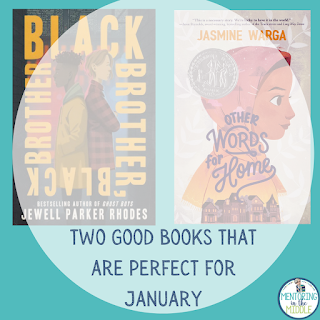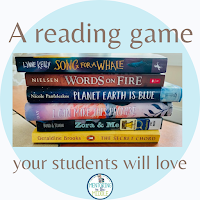Other Words for Home
"My school is filled with kids who do not look like me.
Kids with pale freckled skin,
kids with hair the color of summertime corn.
And kids with skin darker than mine,
kids shorter than me,
and kids taller than me.
I have never seen so many
different types of people in one place."
Kids with pale freckled skin,
kids with hair the color of summertime corn.
And kids with skin darker than mine,
kids shorter than me,
and kids taller than me.
I have never seen so many
different types of people in one place."
Jude and her pregnant mother have had to flee from Syria after the civil war broke out. Her brother stayed behind to fight against the government that is increasingly violent and her dad stayed to keep the family business going.
Moving to Cincinnati to live with her aunt, uncle, and cousin is overwhelming. This new country is loud and has too many choices, too many people, and buildings. To make matters worse, Jude doesn't speak English well.
Jasmine Warga starts the book in a small, sunny town in Syria near the ocean, and you feel Jude's longing to return to its familiar simplicity, knowing she can't because of the war.
"Back home,
food was
rice
lamb
fish, hummus
pita bread
olives
za'atar with olive oil.
Here,
that food is
Middle Eastern food.
Baguettes are French food.
Spaghetti is Italian food.
Pizza is both American and Italian,
depending on which restaurant you go to.
Every food has a label.
It is sorted and assigned.
Just like I am no longer
a girl.
I'm a Middle Eastern girl.
A Syrian girl.
A Muslim girl.
Americans love labels."
Slowly, over the course of months, Jude finds safe havens, friends, and finally, her voice. This book, written in verse, is a quick read, and an excellent look both backward and forwards. Students will connect to Jude's experiences - some not so different from their own - while learning about the challenges refugees face in the United States.
Black Brother, Black Brother
Jewell Parker Rhodes is a magician. The more I read her books, the more I'm impressed with the way she interlays one difficult concept over another, making her characters readable and likable while raising awareness of the injustices they face.
Donte and Trey are brothers, although they look nothing alike. Trey, older by two years, takes after his dad with wavy blonde hair; he presents as white. Donte looks like his mother with brown skin and eyes.
When they move from New York City to the suburbs of Boston, they enroll in a prestigious private school, where Trey takes off, making friends and playing sports. Donte gets hit with micro and macro aggressions from students - one in particular - teachers and administrators, that cause him to question himself in a way he never did before.
"Students at Middlefield Prep think we're funny. 'How can you be brothers?'
But it's Alan who punishes, who makes me being darker than my brother a crime."
"Contradictions rattle, hurt my mind. (Be tough. Don't be tough.
Don't be tough, get bullied.
Be black, tough can get you killed.)
I shake my head. Bullies, prejudiced, ignorant people make life hard."
Trey thinks Donte should beat Alan at what he's good at, fencing. Donte doesn't only know nothing about fencing, he doesn't consider himself athletic.
Over time he learns about Arden Jones, an African-American former Olympic medalist in foil fencing, who works at the Boston Boys and Girls athletic club. Jones had some rough experiences on the Olympic team and has no interest in coaching him, but slowly, both man and boy lean into their mutual interest and begin.
As Donte (and we, as readers) learn more about fencing, our appreciation grows for how much of a mental game it can be. Donte lives and breathes this stuff so much that he begins to understand its concepts off the mat as well.
Jewell Parker Rhodes works magic in a couple of ways. It is heartbreaking to watch how Donte is treated in comparison to his brother, how living in a fancy neighborhood and going to a private school doesn't change attitudes about him, and in many ways protects the white, more-monied bully.
Donte's relationship with Coach is brilliantly written, and our introduction to fencing is interlaced with important themes in the chapters.
Well done, Jewell Parker Rhodes!
If you're looking for a fun way to get your students to read (and share) the books they're reading independently, click here!



No comments
Post a Comment